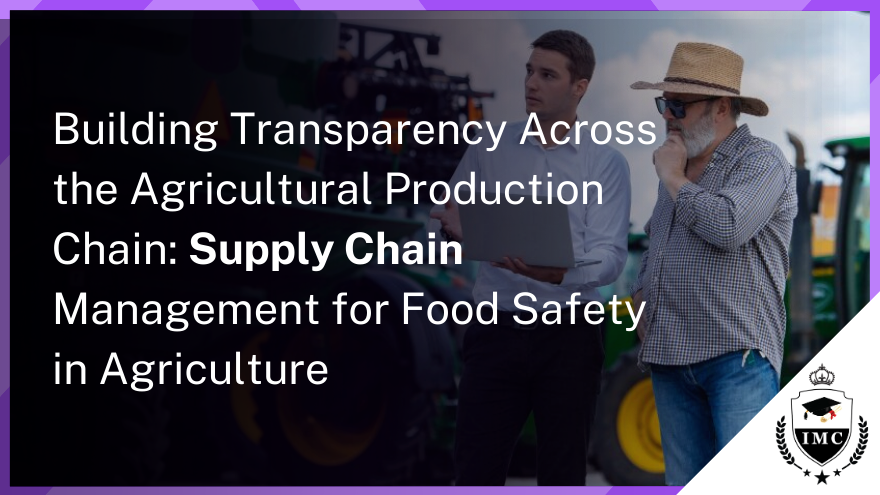Foodborne illnesses remain a major threat to public health around the world. The World Health Organization estimates that nearly 1 in 10 people fall ill annually from eating contaminated food, resulting in 420,000 deaths. The economic costs are also staggering, with studies estimating foodborne illnesses cost over $150 billion globally in medical expenses and lost productivity. Preventing food contamination during production, processing, transport and sale is critical to protect consumers. The agriculture industry in particular faces unique challenges in managing complex, fragmented supply chains spanning vast geographies. However, implementing robust supply chain management practices can significantly enhance food safety across agricultural operations. Coordinating actions across the planting, growing, harvesting, storage, processing, distribution and sale of food products allows for greater oversight and control to reduce safety hazards. Agricultural businesses that invest in supply chain transparency, tracking, proper transportation and storage, supplier management, worker training and testing can reduce foodborne pathogens, quickly address emerging threats, comply with regulations, and meet consumer demands for safety. While requiring upfront investments, supply chain management systems deliver major rewards for public health and business resilience.
Supply Chain Management in Agriculture:
The agriculture supply chain involves numerous steps, from planting seeds and raising crops to harvesting, storage, processing, distribution, and final sale. There are opportunities for contamination and growth of pathogens at each step. Supply chain management focuses on coordinating and overseeing these complex networks to prevent problems.
Key aspects of Supply chain management for safety include:
Traceability - Tracking food items across every step of the supply chain to enable rapid response to contamination issues. Technologies like barcode scanning and RFID tagging support traceability.
Transportation - Following proper protocols for safe transport of agricultural products, including maintaining proper temperatures and preventing cross-contamination.
Storage - Storing products under conditions that minimize spoilage and pathogen growth, such as proper temperatures and moisture levels. Proper pest control is also essential.
Supplier management - Carefully selecting suppliers and requiring they follow safety protocols for items like seeds, fertilizers, equipment, and ingredients. Conducting audits helps verify compliance.
Training - Educating all workers involved in the supply chain, from farm to fork, on safe food handling practices.
Testing and analysis - Testing for microbial and chemical hazards at critical points in the supply chain to catch issues before products get widespread distribution.
Benefits of Supply Chain Management for Food Safety:
- Preventing and quickly catching contamination issues before they impact consumers. This saves lives and prevents illnesses.
- Avoiding costly recalls and destruction of contaminated products by catching issues early. This saves companies significant amounts of money.
- Increasing consumer trust and brand reputation through commitment to food safety and transparent practices. This builds loyalty and sales.
- Complying with government food safety regulations and requirements. Effective supply chain management demonstrates diligence.
- Accessing new markets or customers with stringent food safety demands by showing robust safety practices.
Implementing Supply chain management requires upfront investments but pays off through decreased costs from contamination issues and increased market opportunities. With food safety always top-of-mind for consumers, companies should make it a priority. Partnering with suppliers, distributors, retailers and foodservice companies to enhance safety across every step is key. Technology improvements provide helpful tools to advance agricultural supply chain management. The result is safer food on tables around the world.
What's Included in IMC Institute Certification Programs:
- Tailor-made and personalized learning program based on current industry needs
- Live instructor-led and self-paced learning options
- Flexible schedule to fit training sessions into your calendar
- Direct project coaching and support from experts
- Comprehensive curriculum developed by industry advisors Dual certification:
- UAE + UK (London) 24/7 service and support
- Access to cutting-edge technologies and tools for practical implementation
- Networking opportunities with industry professionals and peers
- Continuous updates to course materials to reflect the latest industry standards and regulations
- Hands-on exercises and case studies for real-world application of knowledge
- Career guidance and job placement assistance for successful graduates
Our comprehensive certification program equips professionals with the latest knowledge and skills to excel in logistics, procurement, warehousing, distribution and more.
The curriculum covers:
- Supply chain fundamentals
- Procurement methodologies
- Warehousing and inventory management
- Transportation and logistics optimization Managing relationships with suppliers, vendors and customers
- Information systems and new technologies impacting supply chain Sustainability,
- risk management and compliance
Summary:
Foodborne illness remains an endemic threat around the world, resulting in medical harm, lives lost, and extensive economic costs. Strengthening supply chain management across the expansive global agriculture industry provides a proactive way to enhance food safety from farm to table. By implementing traceability systems, ensuring proper transport and storage, training workers, auditing suppliers, and actively testing for hazards, agricultural businesses can transform supply chain transparency and coordinate prevention efforts. Although creating robust Supply chain management requires significant initial resources and commitment, the long-term benefits are substantial. Enhanced supply chain systems in agriculture enable rapid response to contamination events, avoidance of costly recalls and withdrawals, compliance with government requirements, and meeting consumer demands for safe food. Most critically, aggressive supply chain management in agriculture can save lives and prevent illnesses by stopping foodborne pathogens from reaching consumers' plates. With diligent work to close gaps and establish oversight across their supply networks, agricultural enterprises canmake major strides in promoting food safety and maintaining public trust.






